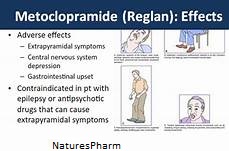What is Reglan?
Reglan is a popular medication taken by people to treat specific conditions of their intestines and stomach. Doctors often prescribe it as a short-term treatment (no longer than 3 months) for persistent heartburn when standard meds don’t work well. Besides, this medication is taken by diabetic patients who suffer from poor emptying of the stomach. Treating this medical condition may result in reducing such unpleasant symptoms as vomiting and nausea. Reglan works by blocking dopamine and speeding up the movement of upper intestines and stomach emptying. Sometimes, this medication is prescribed to prevent vomiting and nausea from radiation or chemotherapy treatments for cancer.
Recommendations for Use
Basically, you need to take Reglan orally 30 minutes before any food intake or at bedtime. Most patients are prescribed to take it 4 times a day, and their regular doses are based on their health conditions, weight and personal response. When taking it in high doses or for a long period of time, you risk ending up with certain withdrawal symptoms, such as headaches, nervousness, dizziness and others. To prevent them, you need to decrease your regular dosage gradually.
Precautions and Contraindications
Before you start taking Reglan, it’s important to inform doctors about any possible allergies and other health conditions, especially when it comes to diabetes, hypertension, breast cancer, bleeding or blockage in your stomach or intestines, kidney problems, mood and mental changes, heart failure, seizures and some others. The use of this medicine can make you feel drowsy and dizzy, so you shouldn’t drive or do other activities that require your full alertness. You also need to avoid drinking alcohol, and if you have diabetes, your blood sugar levels must be controlled on a regular basis. Some patients prefer to adjust their diabetes meds, diet plans and do other lifestyle changes while taking Reglan. Older patients and children are more sensitive to its side effects, especially muscle spasms, drowsiness and some others.
Drug Interactions
There are specific meds that shouldn’t be taken together with Reglan because of possible drug interactions. For instance, some of them include dopamine agonists, tranquilizers, MAO inhibitors, pramlinetide, tacrolimus, anticholinergic meds, cough pills, narcotic pain killers, antihistamines, pills for anxiety and sleep, muscle relaxants, etc. That’s why you always need to read their labels and talk to your doctor about meds that you’re taking before starting this treatment. Drug interactions are dangerous because they change the way Reglan works and increase its side effects mentioned below.
Side Effects
The intake of Reglan is associated with specific adverse effects, such as unusual tiredness, dizziness, drowsiness, agitation, diarrhea, trouble sleeping, headaches and others. However, most of them are rare and mild, so many patients take this medication without any discomfort. Call your doctor once you notice any serious side effects, including unusual mood and mental changes, muscle spasms, reduced sexual drive, tender or enlarged breasts, changes in menstruation, inability to keep still, uncontrolled muscle movements, swelling, abnormal production of breast milk, etc. Finally, there are some unlikely side effects that may be resulted by Reglan, including tremors, muscle stiffness, difficult movement, allergic reactions, nervous system problems and mask-like facial expressions.


